"The Dovzhenko Centre is the guardian of cultural memory. If the Centre should be destroyed, there will be a big gap in culture" — Olena Honcharuk
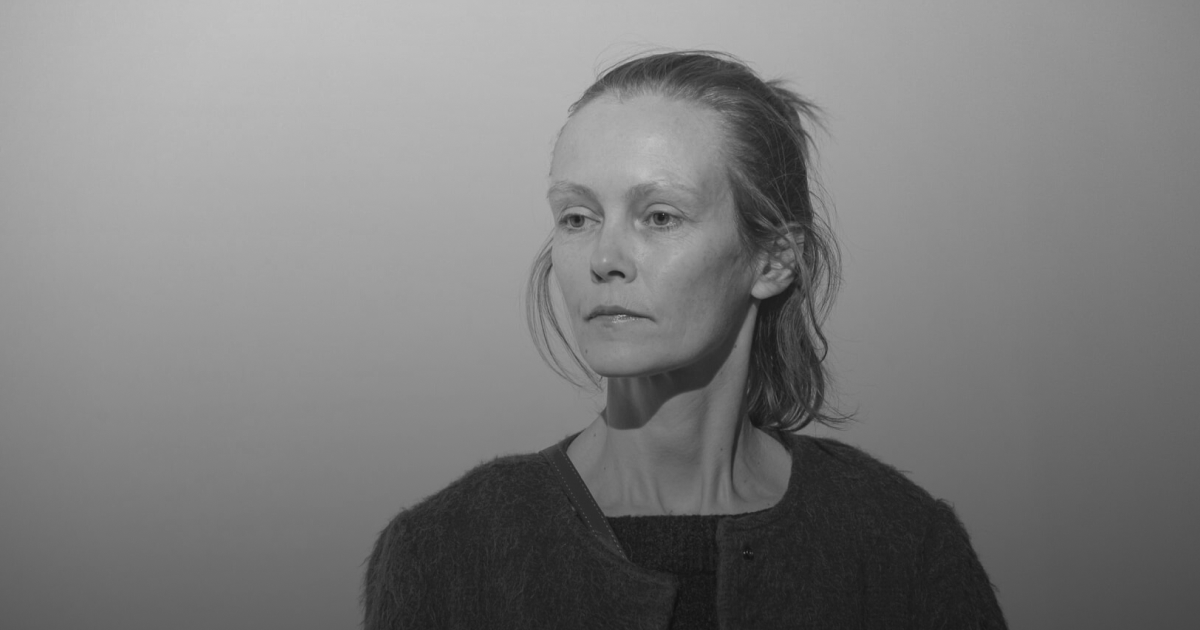
In August last year, the State Film Agency issued an order to reorganise the Dovzhenko Centre (State Film Archive): all films from the collection should go to the state organisation Scientific Centre of Cinematography of Ukraine, and the copyright for animation should go to the Ukrainian Animation Studio.
This decision outraged both the Dovzhenko Centre staff and civil society. The State Film Agency stated that the Dovzhenko Centre was unprofitable and that Ukrainian Animation Studio's state-owned enterprise would become its legal successor in property and non-property rights and obligations.
Later, the State Film Agency suspended Olena Honcharuk, who had won the competition for the position in 2021, from her duties as acting director of the Dovzhenko Centre. She was replaced by Yulia Kazhdan, whose previous work had nothing to do with cinema. Subsequently, several events occurred around the centre: searches, a lawsuit, and a new competition for the director position.
Olena Honcharuk won it twice, and she tells us about the changes in the centre's work after it came under the leadership of the Ukrainian State Film Agency, what is happening regarding the lawsuits, and why the Dovzhenko Centre is vital to the public.
— The Dovzhenko Centre came under the administration of the State Film Agency in July last year. Then, the State Film Agency tried to change the statute. What did these changes involve?
— After the Dovzhenko Centre came under the management of the State Film Agency, the Agency never visited the Centre to meet the staff, see who worked there, and explain how we would continue to work together.
The first step was a remote inspection. Then we received information that the State Film Agency was trying to reorganise us. At that time, there was no talk of changes to the charter. We did not officially see them until 2023, although they claimed to have approved it in November 2022.
The Ukrainian State Film Agency plans to change the purpose of its activities completely. Now, it is the preservation, protection and promotion of cinematic heritage, but it will be entrepreneurial activity in cinema in the future. It's like a carte blanche because it expands our possibilities, and we can become a commercial company. Still, the State Film Agency is interested in something other than what to do with the collection, which is not commercial.
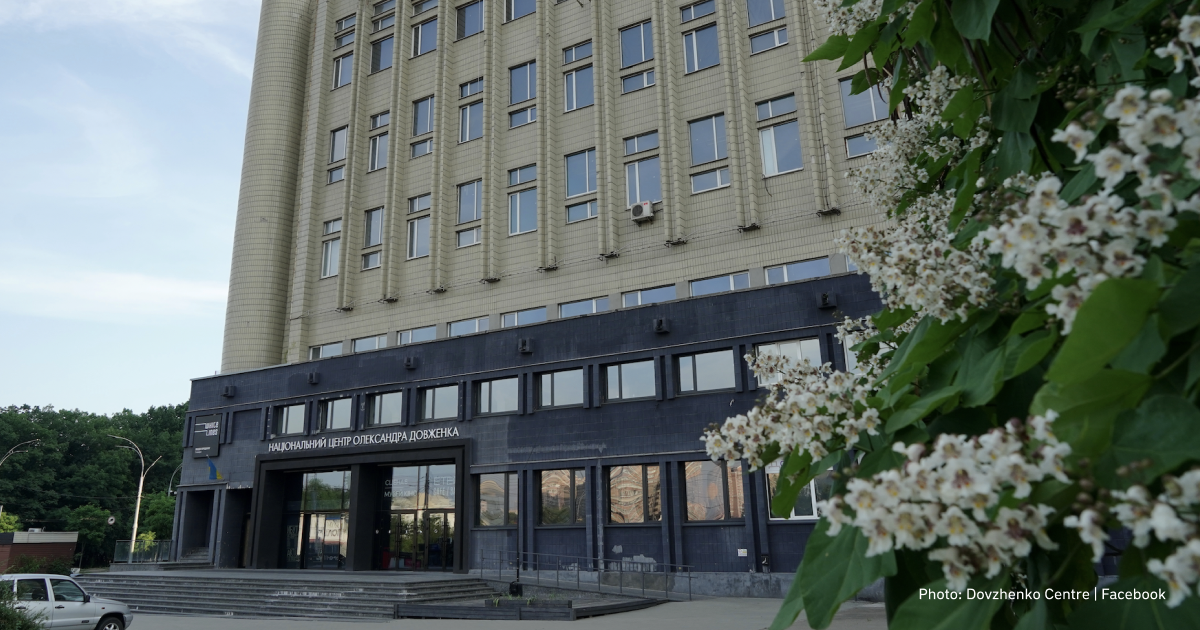
— How did the state regulate the work of the Centre before it came under the direction of the Ukrainian State Film Agency?
— The Dovzhenko Centre is independent in the way it exercises its powers.
We have a specific range of tasks that other institutions in Ukraine do not work on. The Dovzhenko Centre is the only film fund in Ukraine that preserves and researches animation, documentary and scientific films as art.
In this respect, we are close to the British Film Institute, the German Film Archive and the Polish National Film Library.
Another task is the repatriation of Ukrainian cinema, i.e. the search for Ukrainian cinema in the world, including Russia, to bring it back to Ukraine and to have a complete picture of our cinema.
The task of the Ministry, as the governing body, and the State Film Agency is to create the conditions for the Dovzhenko Centre to carry out its functions to a high standard. This is something the current management body not only fails to do but sabotages.
— How were you informed about the reorganisation of the Dovzhenko Centre? Why did they choose to carry it out, and what can happen as a result?
— A little more than a month passed between the centre's transfer and the reorganisation order's appearance: On June 30, the order was handed over, and on August 5, it was signed. The Centre received it only on August 16. No one knows why they didn't send it sooner.
There was no other communication that this was appropriate or necessary.
The State Film Agency became the owner, so they immediately decided to reorganise without clarifying how the Centre works and what it is for.
The main subject of the decree is the separation of Ukrainian animation, but this is only the tip of the iceberg. What is the purpose of separating Ukrainian Animation, which has long been in decline? The Dovzhenko Centre took it over so that its main assets would be recovered: the rights and some materials proving the production of Ukrainian animation. It is unclear what the Ukrainian State Film Agency is trying to revive as part of the animation spin-off.
But the riskier part of the reorganisation is taking away the film collection the centre had built up and handing it over to a no-name institution that has never been involved. The role of the Scientific Centre of Cinematography is to provide educational services, not to preserve and research films.
What is more, the strategy of the State Film Agency, which they have developed in secret and are ashamed to make public, suggests that this will not be the final destination of the films, i.e. the Cinema Research Centre will be transformed into a State Film Fund. This poses a risk to the collection, as films may be lost at this stage.
The Ukrainian State Film Agency does not support the preservation of films on film, which is contrary to international practice: this is the policy of the Digitisation of Film Heritage, which preserves films made since 1909. The collection also includes documents related to the films, scripts, posters, and authors' texts.
— In October 2022, the editorial office sent a request for reorganisation to the Ukrainian State Film Agency. We were told that the Dovzhenko Centre would be replaced by the State Film Fund, which still exists only in theory. At the same time, the State Film Agency has not publicly announced these intentions. Are you aware of this?
— The concept of the State Film Fund exists in the law on cinematography. The State Film Fund is a state cultural institution that preserves, multiplies and promotes the research of the National Film Fund.
De facto, this institution is the Dovzhenko Centre because, in 1994, the centre was created for this very purpose. The Dovzhenko Centre's functions align with those envisaged by the law on the State Film Fund. But for some reason, the Dovzhenko Centre is not identified as the State Film Fund.
It would be a sensible decision not to reorganise the centre as it is but to bring the legal framework into line to protect the centre. The physical media, knowledge and specialists who work with it are priceless. But it's not about preserving films. It's about solving some financial issues.
— At the end of November, court hearings on reversing the reorganisation decision began. What is happening in the court proceedings now? What arguments do the representatives of the Ukrainian State Film Agency give in favour of the reorganisation?
— This is a complicated process. It is unprecedented for the court. In addition to an attempt to cancel an illegal order, it is also an attempt to find out what the institution is.
The Dovzhenko Centre remains positioned to defend its right to exist and disagree with illegal or harmful orders.
The State Film Agency's lawyers insist that neither the collection nor the centre itself is needed, nor does it have any value, so something new is required. When asked whether Dovzhenko's films are cultural heritage, they are stumped because they have previously stated that neither the boxes nor the film are of cultural value.
It is wrong to destroy the only film archive in the country that works with cinema. Our foreign partners do not understand this, and it seems absurd to them to destroy an institution that preserves cinematic memory in a country where the war is ongoing.
— A meeting was held between representatives of the Ministry of Culture, the State Film Agency and the Dovzhenko Centre. Afterwards, former Culture Minister Tkachenko announced that the reorganisation was suspended. It wasn't a question of cancellation. What was agreed upon then?
— The impression is that it was an imitation of democracy. The impetus for this meeting was the dviz-discovery (a film screening that turned into an action of resistance — ed.) We did not plan it. It was a step taken by visitors who came to the stairs of the centre with slogans like "Down with Tkachenko" and "Down with Kuderchuk".
I think it hurt Tkachenko. It also coincided with the liberation of Kherson, and the public had many questions about the evacuation of the Kherson museums and the state of collections and museums in the de-occupied and occupied territories.
In my opinion, it was staged to show we were heard. But this meeting did not produce any results.
— You have twice won the competition to head the Dovzhenko Centre. The contract with you was not signed, and now you are trying to get it signed in court. What are the arguments of the State Film Agency for not signing the contract?
— The State Film Agency was not against signing the contract they offered, but their version of the contract is a sentence. And I don't want to sign my death warrant. I want to be the director of the Dovzhenko Centre. I want the institution to be successful.
The contract contains risks for me. My plans do not include the reorganisation of the Dovzhenko Centre in the way the State Film Agency sees it. I consider it unacceptable to change the charter or interfere in the decisions of film critics, film researchers and the film collection.
The Centre is a professional institution whose expertise should be trusted, listened to and supported.
I did not refuse the contract or agree to sign it as proposed. This was confirmed by the lawyers who came to the meeting with me.
Moreover, the State Film Agency offered me the contract on the last day, so that I couldn't read it.
— A criminal case has been opened against you, with the State Film Agency as the plaintiff. Can you comment on the details?
— The State Film Agency did this on the eve of the competition meeting. In the evening, social media started to spread the word that a criminal case had been opened against me. But this is not a charge. I have not been found guilty.
But a criminal case is no game. Someone leaked this information to discredit my candidacy during the competition. Since it didn't work, the building of the State Film Agency was miraculously mined on the day of the competition. It is not known how people with explosives got into the guarded area, where you can only go with permission and access.
The next session took place as usual, but the criminal case is still pending somewhere, and I don't know the details.
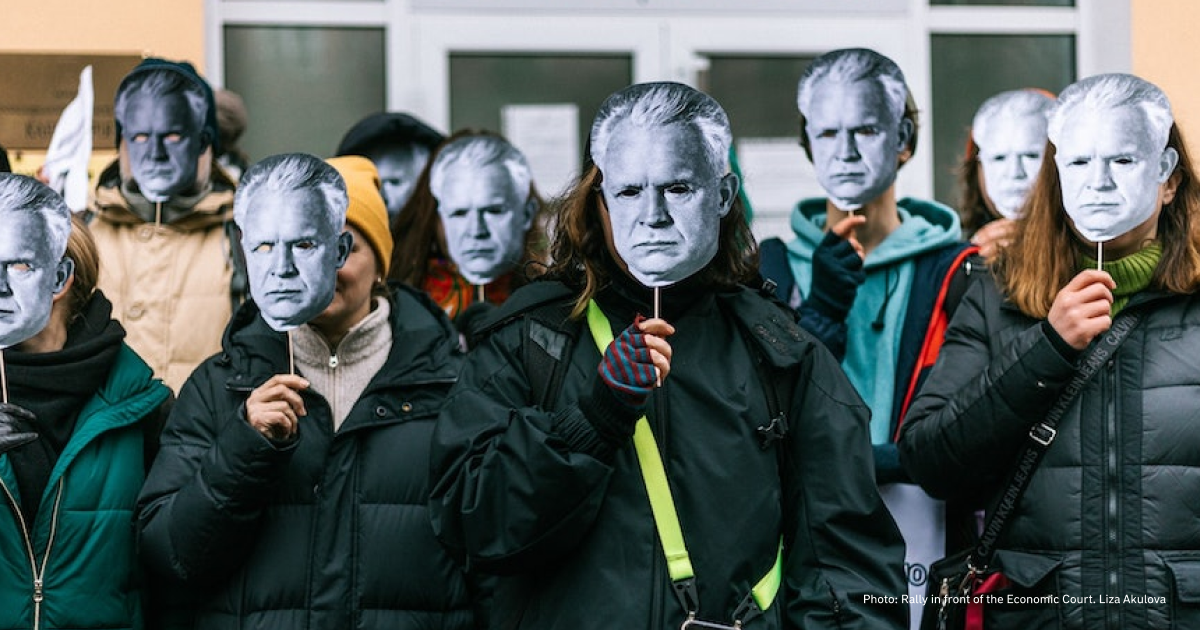
— Law enforcement officers searched the Dovzhenko Centre and seized the centre's seal. What was the reason for the searches?
— I'll summarise it this way: in 2021, a competition was held for the Head of the Dovzhenko Centre. Ivan Kozlenko's term ended, but it was he who formed the Dovzhenko Centre as we know it now. When he refused to take up a new term, I took over.
In April 2021, it was clear that another person should have won. But the jury's votes swayed the competition commission to my side. The other applicant (actress Olena Lavreniuk — ed.) also proposed a development programme for the centre, but this programme was more based on entrepreneurial activity. Film research and heritage preservation were a trailer, not the main driver.
The Ministry of Culture did not sign the contract at that time, but I was given the responsibility. Then, there was a process of confrontation of what the centre would be like. I convinced the minister that the value of the Centre was to move on. The centre works with cinematic heritage, but it is a modern cultural institution that combines visual art, music, theatre and educational projects.
In March, the Ukrainian State Film Agency became the sole governing body for the film industry. Later, the State Film Agency started reorganising.
We do not know what the State Film Agency is doing at other film studios. What is happening to the Odesa film studio? What about Dovzhenko Film Studio, which is in a deplorable state? What about Ukrkinokhronika, which is facing attempts to take away its land? What happened with the kinematics, exposed a large-scale property and land privatisation scheme?
If we talk about the searches at the Dovzhenko Centre, these are all parts of the same story.
Someone needs this site, this building, this institution. They want to take it away. For what purpose? We don't know. Yet, they use various tricks in the form of searches, intimidation, pressure, reduction of funding, and change of managers.
— How does the Dovzhenko Centre work now? How much did all this affect the work?
— All employees of the Dovzhenko Centre understand that our activities are essential. We cannot put it on hold. Minister Tkachenko said at international meetings and forums that culture is important. Similarly, Maryna Kuderchuk says that culture is important. But there is nothing behind these words. If culture is influential, they should promote it first and foremost within the country.
When people abroad see that we have such contradictory processes, they wonder why they should help us if we cannot give credit to ourselves. Speaking of the Dovzhenko Centre, other options exist besides stopping its activities.
The world has a well-established habit of consuming Russian culture. War is terrible, but why not watch a ballet? Or read a book written 100 years ago? We love these artists so much. Why not enjoy them?
This is the right time to break with this reference point and stop associating ourselves with Russian culture. Secondly, the army shows success, but at a considerable cost, so culture is now obliged to produce meaning.
We must work, show films, talk about them, and eventually provide jobs.
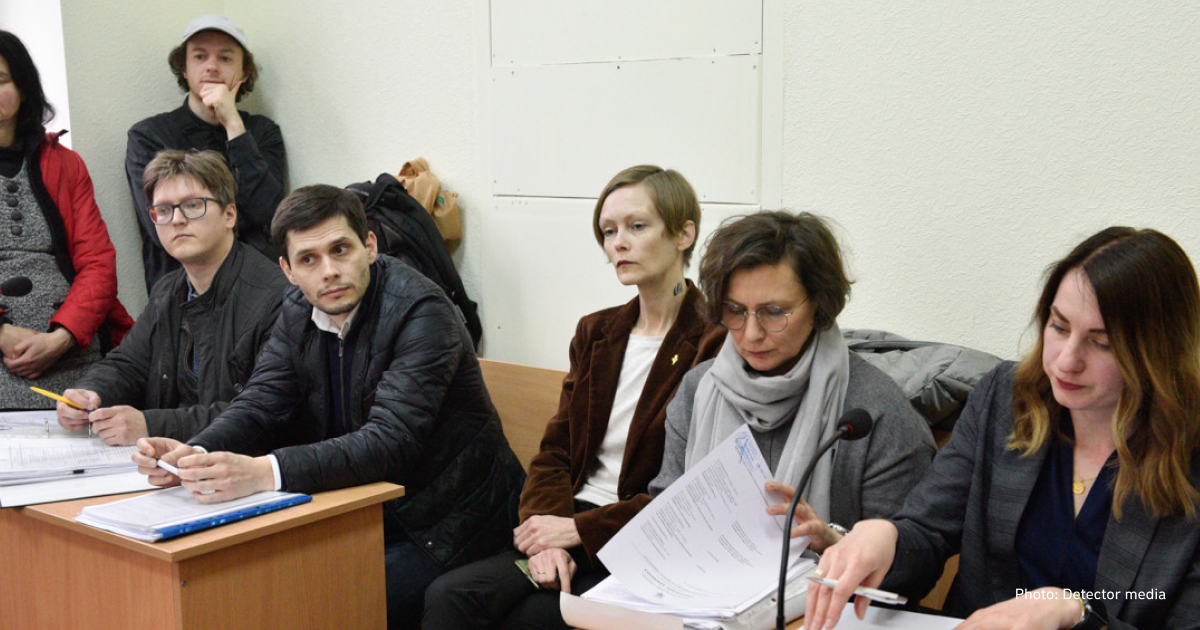
— What is the core value of the Dovzhenko Centre? What can civil society do to prevent the reorganisation?
— Most of those who have gone abroad are young people. They are the future of the country. I think those who have left must have a reason to come back.
Ukrainian cinema is one of those reasons — and not just cinema. We have begun to defend our right to work. This willingness to defend what is ours is a unique trait. This spirit of protecting one's value is prevalent now.
Russia owns a large part of our cultural memory. They continue to do so, taking everything they can from our territory. They are taking art, kidnapping children, and trying to appropriate our memory and control it.
I think it is essential that we are in charge of our memory and have the opportunity to work with it, to understand it, not just idealise it or mythologise it.
The Dovzhenko Centre is the guardian of this memory. If the Centre should be destroyed, there will be a considerable gap in our culture in historical continuity. We could tell the audience that Ukrainian cinema has existed since the end of the 19th century and was born together with world cinema. And until the late 1920s, Ukraine was an equal member of the world's film platforms.
Then, in 1930, Russia took away our cinematic heritage. Then came the poetic cinema, then there was another dip, then 1991 — and we are gradually getting back on our feet.
The Centre is a confirmation that Ukrainian cinema exists. If the Centre disappears, the proof will disappear, and our memory will be dominated by somebody else again.
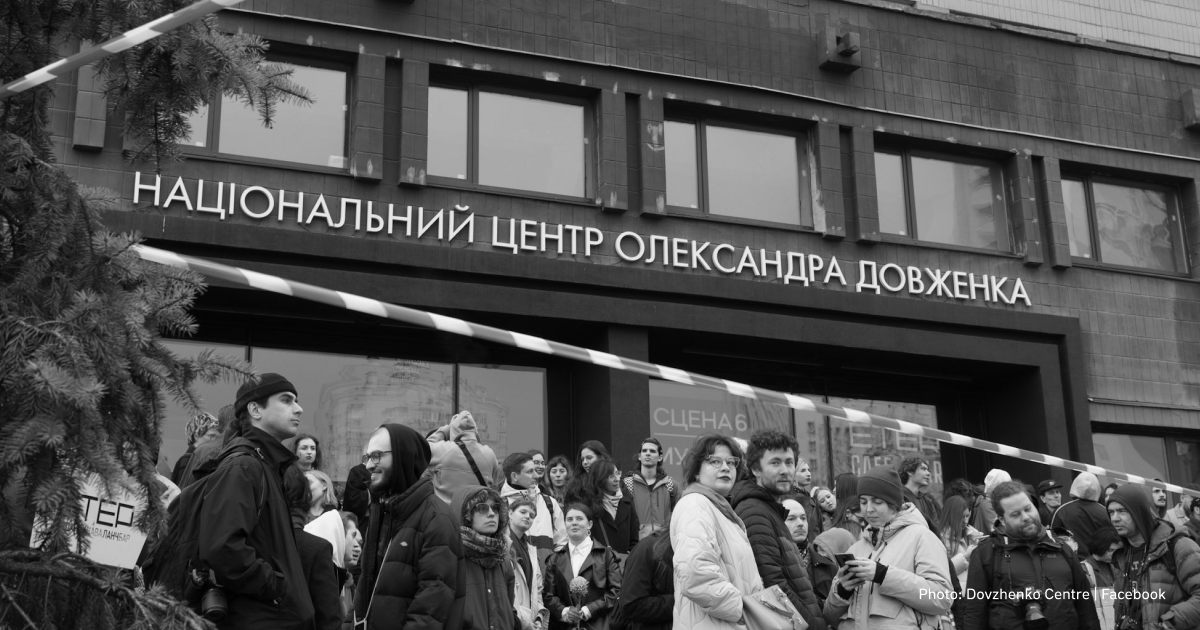
***
In late June 2023, the State Film Agency cancelled the decree on reorganising the Dovzhenko Centre. The Centre said the decision was unexpected, as the court case lasted almost nine months.
"We could rejoice at this gesture, made symbolically on the occasion of Constitution Day, but we know that the State Film Agency has the power to issue and cancel such orders daily. Soon, we may receive a new order, just as threatening and unreasonable," the Dovzhenko Centre wrote.
In July, the Kyiv Economic District Court declared the order to reorganise the Dovzhenko Centre illegal.
In October 2023, the Ukrainian State Film Agency submitted to the Cabinet of Ministers a "Draft Strategy for the Development of Cinema until 2027", which provides for the "optimisation" of the Dovzhenko Centre. The centre itself said that it was to be liquidated. The film community reacted to this and called for a new transparent competition and the development of a new draft Strategy.


